上海细胞库
人源细胞系| 稳转细胞系| 基因敲除株| 基因点突变细胞株| 基因过表达细胞株| 重组细胞系| 猪的细胞系| 马细胞系| 兔的细胞系| 犬的细胞系| 山羊的细胞系| 鱼的细胞系| 猴的细胞系| 仓鼠的细胞系| 狗的细胞系| 牛的细胞| 大鼠细胞系| 小鼠细胞系| 其他细胞系|

| 规格 | 价格 | 库存 |
|---|---|---|
| 100ul | ¥ 1880 | 200 |
| 200ul | ¥ 2900 | 200 |
| 50ul | ¥ 1200 | 7 |
| 英文名称 | CLK2 |
| 中文名称 | 细胞分裂周期样激酶2抗体 |
| 别 名 | CDC like kinase 2; CLK 2; CLK kinase; Clk2 Scamp3; Dual specificity protein kinase CLK2; hCLK 2; hCLK2; MGC61500; Tu52; CLK2_HUMAN. |
| 研究领域 | 细胞生物 信号转导 细胞周期蛋白 激酶和磷酸酶 细胞分化 表观遗传学 |
| 抗体来源 | Rabbit |
| 克隆类型 | Polyclonal |
| 交叉反应 | Human, Mouse, Rat, (predicted: Chicken, Dog, Pig, Cow, Horse, Rabbit, ) |
| 产品应用 | WB=1:500-2000 ELISA=1:500-1000 IHC-P=1:100-500 IHC-F=1:100-500 IF=1:100-500 (石蜡切片需做抗原修复) not yet tested in other applications. optimal dilutions/concentrations should be determined by the end user. |
| 分 子 量 | 60kDa |
| 细胞定位 | 细胞核 |
| 性 状 | Liquid |
| 浓 度 | 1mg/ml |
| 免 疫 原 | KLH conjugated synthetic peptide derived from human CLK2:401-499/499 |
| 亚 型 | IgG |
| 纯化方法 | affinity purified by Protein A |
| 储 存 液 | 0.01M TBS(pH7.4) with 1% BSA, 0.03% Proclin300 and 50% Glycerol. |
| 保存条件 | Shipped at 4℃. Store at -20 °C for one year. Avoid repeated freeze/thaw cycles. |
| PubMed | PubMed |
| 产品介绍 | CDC-like kinase 2 (CLK2) belongs to a family of autophosphorylating kinases termed CLK (CDC2/CDC28-like kinases), which have been shown to phosphorylate serine- and arginine-rich (SR) proteins of the spliceosomal complex, and to influence alternative splicing in overexpression systems. Recent findings demonstrated that the CLK kinases activate PTP-1B family members, and this phosphatase may be an important cellular target for CLK action. Mutations in the CLK2 proteins affect organismal features such as development, behavior, reproduction, and aging as well as cellular features such as the cell cycle, apoptosis, the DNA replication checkpoint, and telomere length. Function: Dual specificity kinase acting on both serine/threonine and tyrosine-containing substrates. Phosphorylates serine- and arginine-rich (SR) proteins of the spliceosomal complex. May be a constituent of a network of regulatory mechanisms that enable SR proteins to control RNA splicing and can cause redistribution of SR proteins from speckles to a diffuse nucleoplasmic distribution. Acts as a suppressor of hepatic gluconeogenesis and glucose output by repressing PPARGC1A transcriptional activity on gluconeogenic genes via its phosphorylation. Phosphorylates PPP2R5B thereby stimulating the assembly of PP2A phosphatase with the PPP2R5B-AKT1 complex leading to dephosphorylation of AKT1. Phosphorylates: PTPN1, SRSF1 and SRSF3. Regulates the alternative splicing of tissue factor (F3) pre-mRNA in endothelial cells. Subunit: Interacts with RBMX. Interacts with AKT1 and UBL5. Subcellular Location: Isoform 1: Nucleus. Nucleus speckle. Isoform 2: Nucleus speckle. Tissue Specificity: Endothelial cells. Post-translational modifications: Autophosphorylates on all three types of residues. Phosphorylation on Ser-34 and Thr-127 by AKT1 is induced by ionizing radiation or insulin. Phosphorylation plays a critical role in cell proliferation following low dose radiation and prevents cell death following high dose radiation. Phosphorylation at Thr-344 by PKB/AKT2 induces its kinase activity which is required for its stability. The phosphorylation status at Ser-142 influences its subnuclear localization; inhbition of phosphorylation at Ser-142 results in accumulation in the nuclear speckle. Similarity: Belongs to the protein kinase superfamily. CMGC Ser/Thr protein kinase family. Lammer subfamily. Contains 1 protein kinase domain. SWISS: P49760 Gene ID: 1196 Database links: UniProtKB/Swiss-Prot: P49760.1 Important Note: This product as supplied is intended for research use only, not for use in human, therapeutic or diagnostic applications. |
| 产品图片 | 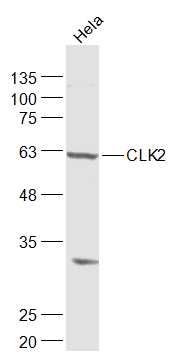 Sample: Sample:Hela(Human) Cell Lysate at 30 ug Primary: Anti-CLK2 (bs-7907R) at 1/1000 dilution Secondary: IRDye800CW Goat Anti-Rabbit IgG at 1/20000 dilution Predicted band size: 60 kD Observed band size: 60 kD 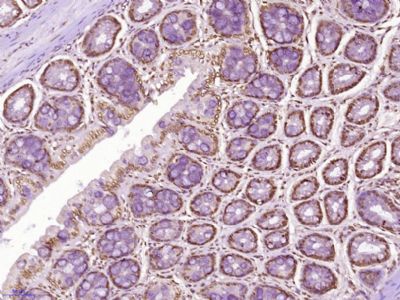 Paraformaldehyde-fixed, paraffin embedded (Rat colon); Antigen retrieval by boiling in sodium citrate buffer (pH6.0) for 15min; Block endogenous peroxidase by 3% hydrogen peroxide for 20 minutes; Blocking buffer (normal goat serum) at 37°C for 30min; Antibody incubation with (CLK2) Polyclonal Antibody, Unconjugated (bs-7907R) at 1:400 overnight at 4°C, followed by operating according to SP Kit(Rabbit) (sp-0023) instructionsand DAB staining. Paraformaldehyde-fixed, paraffin embedded (Rat colon); Antigen retrieval by boiling in sodium citrate buffer (pH6.0) for 15min; Block endogenous peroxidase by 3% hydrogen peroxide for 20 minutes; Blocking buffer (normal goat serum) at 37°C for 30min; Antibody incubation with (CLK2) Polyclonal Antibody, Unconjugated (bs-7907R) at 1:400 overnight at 4°C, followed by operating according to SP Kit(Rabbit) (sp-0023) instructionsand DAB staining.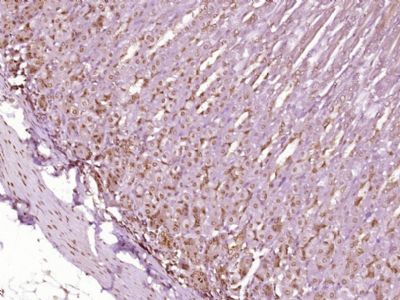 Paraformaldehyde-fixed, paraffin embedded (Mouse stomach); Antigen retrieval by boiling in sodium citrate buffer (pH6.0) for 15min; Block endogenous peroxidase by 3% hydrogen peroxide for 20 minutes; Blocking buffer (normal goat serum) at 37°C for 30min; Antibody incubation with (CLK2) Polyclonal Antibody, Unconjugated (bs-7907R) at 1:400 overnight at 4°C, followed by operating according to SP Kit(Rabbit) (sp-0023) instructionsand DAB staining. Paraformaldehyde-fixed, paraffin embedded (Mouse stomach); Antigen retrieval by boiling in sodium citrate buffer (pH6.0) for 15min; Block endogenous peroxidase by 3% hydrogen peroxide for 20 minutes; Blocking buffer (normal goat serum) at 37°C for 30min; Antibody incubation with (CLK2) Polyclonal Antibody, Unconjugated (bs-7907R) at 1:400 overnight at 4°C, followed by operating according to SP Kit(Rabbit) (sp-0023) instructionsand DAB staining.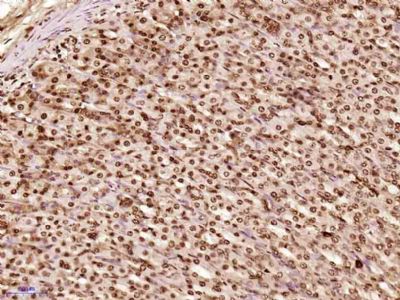 Paraformaldehyde-fixed, paraffin embedded (Rat stomach); Antigen retrieval by boiling in sodium citrate buffer (pH6.0) for 15min; Block endogenous peroxidase by 3% hydrogen peroxide for 20 minutes; Blocking buffer (normal goat serum) at 37°C for 30min; Antibody incubation with (CLK2) Polyclonal Antibody, Unconjugated (bs-7907R) at 1:400 overnight at 4°C, followed by operating according to SP Kit(Rabbit) (sp-0023) instructionsand DAB staining. Paraformaldehyde-fixed, paraffin embedded (Rat stomach); Antigen retrieval by boiling in sodium citrate buffer (pH6.0) for 15min; Block endogenous peroxidase by 3% hydrogen peroxide for 20 minutes; Blocking buffer (normal goat serum) at 37°C for 30min; Antibody incubation with (CLK2) Polyclonal Antibody, Unconjugated (bs-7907R) at 1:400 overnight at 4°C, followed by operating according to SP Kit(Rabbit) (sp-0023) instructionsand DAB staining.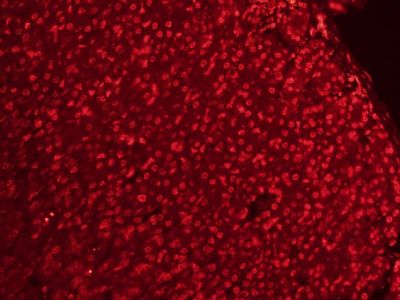 Paraformaldehyde-fixed, paraffin embedded (Mouse stomach); Antigen retrieval by boiling in sodium citrate buffer (pH6.0) for 15min; Block endogenous peroxidase by 3% hydrogen peroxide for 20 minutes; Blocking buffer (normal goat serum) at 37°C for 30min; Antibody incubation with (CLK2) Polyclonal Antibody, Unconjugated (bs-7907R) at 1:400 overnight at 4°C, followed by a conjugated Goat Anti-Rabbit IgG antibody (bs-0295G-CY3) for 90 minutes, and DAPI for nuclei staining. Paraformaldehyde-fixed, paraffin embedded (Mouse stomach); Antigen retrieval by boiling in sodium citrate buffer (pH6.0) for 15min; Block endogenous peroxidase by 3% hydrogen peroxide for 20 minutes; Blocking buffer (normal goat serum) at 37°C for 30min; Antibody incubation with (CLK2) Polyclonal Antibody, Unconjugated (bs-7907R) at 1:400 overnight at 4°C, followed by a conjugated Goat Anti-Rabbit IgG antibody (bs-0295G-CY3) for 90 minutes, and DAPI for nuclei staining.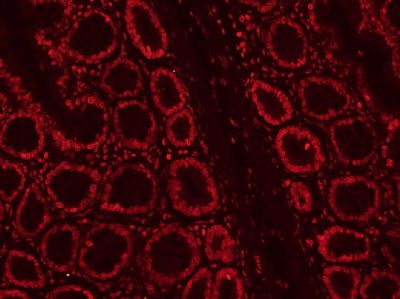 Paraformaldehyde-fixed, paraffin embedded (Rat colon); Antigen retrieval by boiling in sodium citrate buffer (pH6.0) for 15min; Block endogenous peroxidase by 3% hydrogen peroxide for 20 minutes; Blocking buffer (normal goat serum) at 37°C for 30min; Antibody incubation with (CLK2) Polyclonal Antibody, Unconjugated (bs-7907R) at 1:400 overnight at 4°C, followed by a conjugated Goat Anti-Rabbit IgG antibody (bs-0295G-CY3) for 90 minutes, and DAPI for nuclei staining. Paraformaldehyde-fixed, paraffin embedded (Rat colon); Antigen retrieval by boiling in sodium citrate buffer (pH6.0) for 15min; Block endogenous peroxidase by 3% hydrogen peroxide for 20 minutes; Blocking buffer (normal goat serum) at 37°C for 30min; Antibody incubation with (CLK2) Polyclonal Antibody, Unconjugated (bs-7907R) at 1:400 overnight at 4°C, followed by a conjugated Goat Anti-Rabbit IgG antibody (bs-0295G-CY3) for 90 minutes, and DAPI for nuclei staining. |